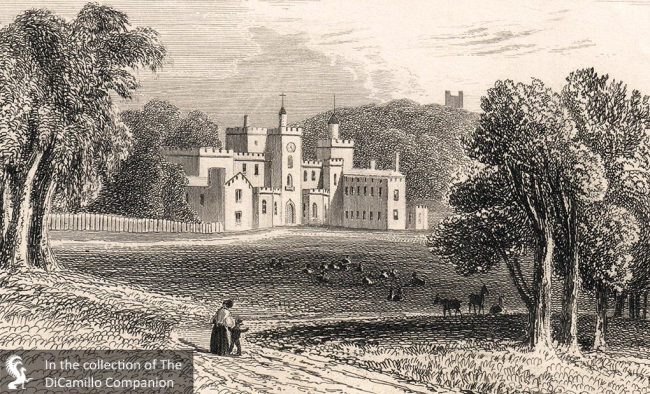
An 1840 engraving of the house from "Dugdale's England and Wales Delineated"
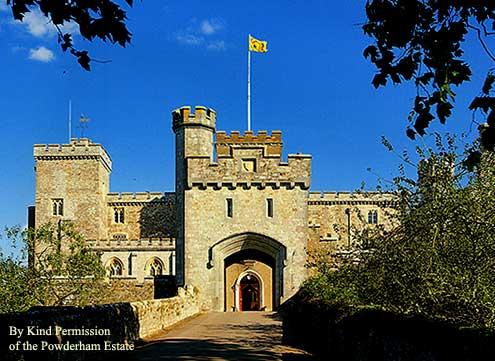
The house in the late 20th century
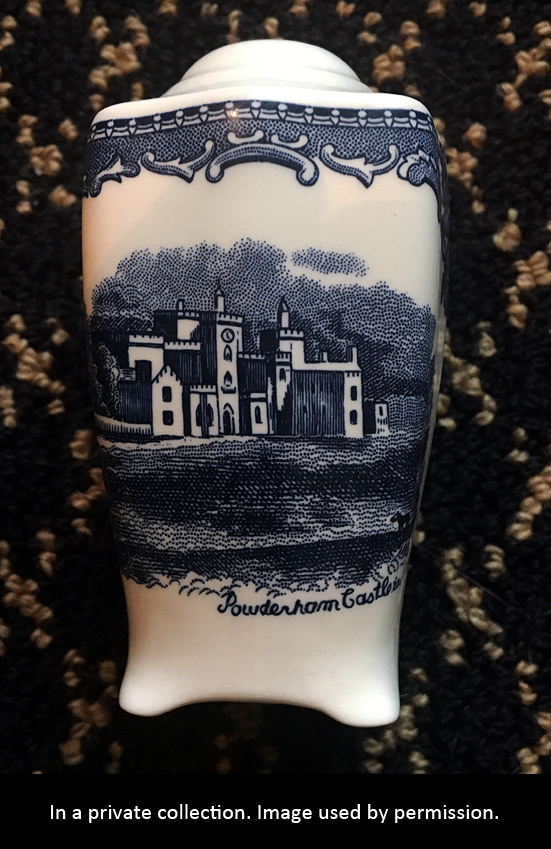
The castle depicted on a mid-20th century Johnson Bros. porcelain salt shaker
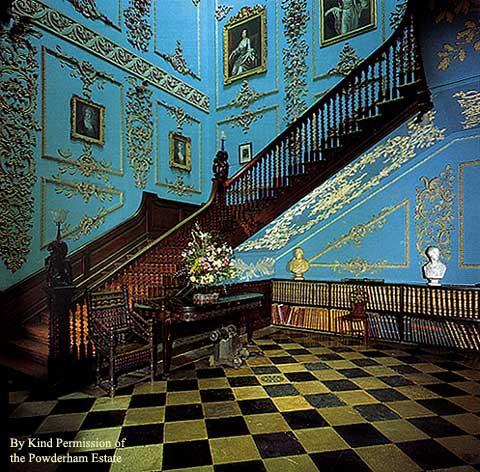
The Staircase Hall
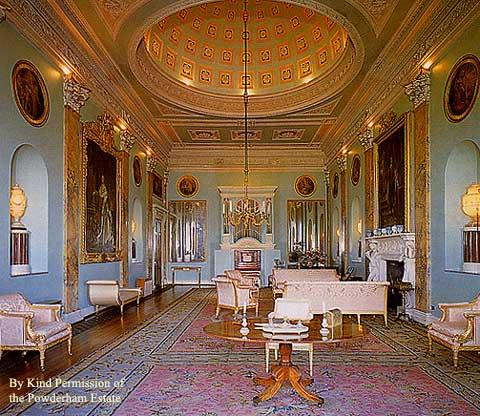
The Music Room
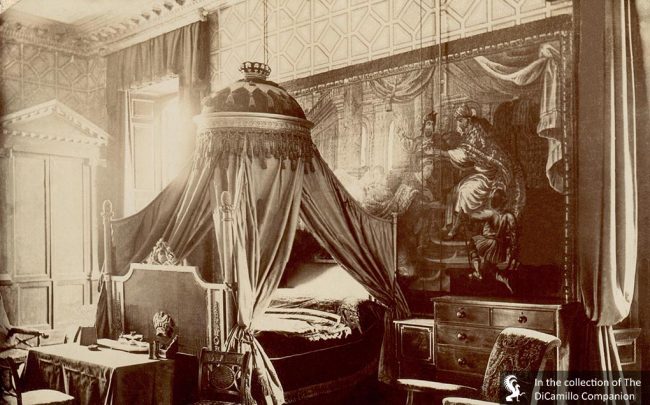
The State Bedroom from a circa 1900 postcard
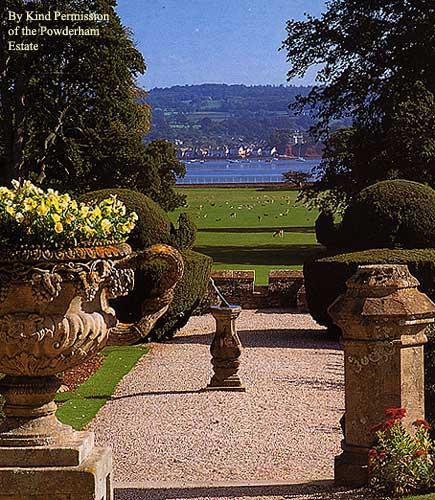
From the Terrace
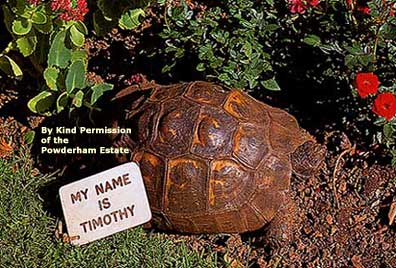
Timothy the Tortoise
Built / Designed For: Sir Philip Courtenay
House & Family History: Powderham was begun by Sir Philip Courtenay in 1390 and has been the seat of his descendants, later the earls of Devon, ever since. It took Sir Philip almost 30 years to complete this fortress on the banks of the River Exe, but the castle that greets the eye of visitors today is largely the result of Victorian renovation by Charles Fowler, architect of Covent Garden, London. But if the exterior is a Victorian recreation of an idealized medieval castle, the interior is pure Georgian country house, with a profusion of elegant rooms topped by carefully molded plasterwork ceilings. An extraordinary centerpiece is provided by the Staircase Hall of 1754-55; designed by James Garrett, this astonishing vision rises to the full height of the house. The walls, encrusted with Rococo plasterwork executed John Jenkins, features birds, animals, and a variety of artistic motifs celebrating the themes of peace and love (the Staircase Hall would have originally been distempered; the current acid blue was installed in the 20th century). Amidst all this Georgian splendor there are still traces of the original medieval house to be found; in the room beside the Great Hall is an overmantel carved with the date 1533, but older still are the 14th century arches leading to the kitchens and buttery. One of the loveliest interiors is the Neoclassical Music Room, created in 1794 for the 3rd Viscount Courtenay's coming-of-age ball. Designed by James Wyatt, the Music Room is noted for its superb fireplace by Richard Westmacott that features life-sized statues of a dancing girl and a Greek shepherd, its original Marsh & Tatham 1790s furniture, and its huge Axminster carpet, also original to the room. Throughout the house is the requisite collection of family portraits, including some dating back to the early 16th century. In 1784 William Beckford was involved in a famous sexual scandal at Powderham with 16-year-old "Kitty" Courtenay (later the 3rd Viscount; the title became extinct upon his death), heir to the Powderham Estate; the affair damaged both reputations for the balance of their lives. Later, circa 1810, Kitty, when informed that the law was after him (probably for homosexual acts), he fled on an American ship under an assumed name. He spent the remaining 25 years of his life abroad, first in New York and then Paris, where he died in 1835. During these years Powderham stood virtually abandoned. In 1939 the 17th Earl of Devon, somewhat scandalously, married a divorcee, Venetia Taylor, who operated a finishing school for girls at Powderham after World War II. The castle opened to the public for the first time in 1959. Powderham's ownership is somewhat unusual in today's environment; it is personally owned by the Earl of Devon, rather than being vested in a non-profit trust. (We are most grateful to Britain Express for contributing to this history of Powderham).
Collections: John Channon of Exeter's two bookcases, made for Powderham's Library in 1740, were sold for £465,000 to the Victoria & Albert Museum by Christie's in 1987 (they remain onsite at Powderham). The luscious rosewood bookcases are decorated with gilded capitals and swags and feature brass inlaid into wood veneers. A suite of furniture with carved dolphins, including a pair of bergère chairs, made for the castle circa 1790 and attributed to Marsh and Tatham, were sold at Christie's on July 5, 1990 for £242,000. Some contents were sold on September 29, 2009 by Sotheby's. In 2006 the 4th Lord Rothschild purchased a full-length 1783 state portrait of Louis XVI by Antoine-Francois Callet (in its original frame by Francois-Charles Buteux) from the 18th Earl of Devon and placed it on long-term loan at Waddesdon Manor. The portrait was purchased circa 1803 by "Kitty" Courtenay, 9th Earl of Devon.
Comments: Mark Girouard on Powderham's Staircase Hall: it is one of "the half-dozen or so most sumptuous surviving examples of Rococo plasterwork in England. It is as though the Palladian barriers had suddenly broken down and a tremendous Rococo flood came sweeping into the castle, leaving, when it had subsided, an extraordinary and wonderful miscellany of objects thickly encrusted on walls and ceilings."
Garden & Outbuildings: In the early 20th century the Powderham Estate stood at 50,000 acres; it is today 3,500 acres. Plantings of daffodils, primroses, and Devon violets make for a profusion of color in the spring. Fallow deer graze in the Deer Park, and in summer visitors can ride the special tractor-trailer cart to view them up close. Just for children is the Secret Garden, full of animals of the soft and cuddly sort, including guinea pigs, rabbits, and pygmy goats. The house sits in a lovely location beside the River Exe, and wonderful views of the Exe Estuary can be had by climbing the Belvedere Tower. (This garden history kindly provided by Britain Express, The UK travel and heritage guide). The Powderham Estate is home to The Old House at Chiverstone, Kenton; this Grade II-listed house, of medieval origins, was remodeled in the 17th century and is believed to have formerly been the manor house. Powderham was also home to the famous Timothy the Tortoise, who died in April 2004, aged approximately 160 years and thought to be Britain's oldest resident. Timothy came to the Courtenay family in 1892; before that he was a ship's mascot, where he saw active service with Capt. John Guy Courtenay Evered. Timothy served with Capt. Courtenay Evered on HMS "Queen" in 1854 during the first bombardment of Sebastopol. Man and tortoise both later moved to HMS "Princess Charlotte" and HMS "Nankin," seeing active service in the East Indies and China between 1857 and 1860. "This entitled Timothy to both service medals," said naval historian Capt. George Cardew, R.N. (Retired). "It was typical of the tortoise's modesty that he chose not to wear them." After service aboard HMS "Nankin" Timothy retired to Powderham Castle. During World War II the tortoise moved from his usual home in the wisteria bed at Powderham and dug his own air raid shelter under the terrace steps; "I think he felt the vibrations of bombs falling on Exeter," said Lady Gabrielle Courtenay, 91, who was at Powderham during the War. In 1926 it was discovered that Timothy was, in fact, a female. On his underside he bore the family motto: "Where have I fallen, what have I done?" Timothy was buried at a family funeral in the grounds of Powderham Castle.
Chapel & Church: Across the rose terrace at the rear of the house is the Chapel, which boasts a wonderful 15th century timber roof.
Architect: Stephen Wright
Date: Circa 1740Architect: John Moyle
Date: 1710-27Architect: James Garrett
Date: 1754-55Architect: James Wyatt
Date: 1794-96Architect: Charles Fowler
Date: 1837-48John Preston (J.P.) Neale, published under the title of Views of the Seats of Noblemen and Gentlemen in England, Wales, Scotland, and Ireland, among other titles: Vol. I, 1818.
Country Life: XXIII, 486, 1908. CXXXIV, 18 plan, 80, 140, 1963.
Title: Old Homes, New Life: The Resurgence of the British Country House
Author: Aslet, Clive
Year Published: 2020
Reference: pgs. 249, 250, 266, 267
Publisher: London: Triglyph Books
ISBN: 9781916355408
Book Type: Hardback
Title: Sotheby's Auction Catalog: Two Noble Collections: Powderham Castle and Seaton Delaval Hall, Sep 29, 2009
Author: NA
Year Published: 2009
Publisher: London: Sotheby's
ISBN: NA
Book Type: Softback
Title: Biographical Dictionary of British Architects, 1600-1840, A - HARDBACK
Author: Colvin, Howard
Year Published: 2008
Reference: pgs. 394, 412, 712, 1186
Publisher: New Haven: Yale University Press
ISBN: 9780300125085
Book Type: Hardback
Title: V&A Guide to Period Styles: 400 Years of British Art and Design, The
Author: Jackson, Anna; Hinton, Morna
Year Published: 2002
Reference: pg. 57
Publisher: London: V&A Publications
ISBN: 0810965909
Book Type: Hardback
Title: Disintegration of a Heritage: Country Houses and their Collections, 1979-1992, The
Author: Sayer, Michael
Year Published: 1993
Publisher: Norfolk: Michael Russell (Publishing)
ISBN: 0859551970
Book Type: Hardback
Title: Merchant Ivory's English Landscape: Rooms, Views, and Anglo-Saxon Attitudes
Author: Pym, John
Year Published: 1995
Publisher: New York: Harry N. Abrams, Inc.
ISBN: 0810942755
Book Type: Hardback
House Listed: Grade I
Park Listed: Grade II*
Current Seat / Home of: Charles Peregrine Courtenay, 19th Earl of Devon; Courtenay family here since 1390.
Past Seat / Home of: Sir Philip Courtenay, circa 1395-63; Sir William Courtenay, 1463-85; William Courtenay, de jure 2nd Earl of Devon, until 1557; William Courtenay, de jure 3rd Earl of Devon, 1557-1630; Francis Courtenay, de jure 4th Earl of Devon, 1630-38; William Courtenay, de jure 5th Earl of Devon, 1638-1702; William Courtenay, de jure 6th Earl of Devon, 1702-35; William Courtenay, 1st Viscount Courtenay and de jure 7th Earl of Devon, 1735-62; William Courtenay, 2nd Viscount Courtenay and de jure 8th Earl of Devon, 1762-88; William "Kitty" Courtenay, 3rd Viscount Courtenay and 9th Earl of Devon, 1788-1810; William Courtenay, 10th Earl of Devon, until 1859; William Reginald Courtenay, 11th Earl of Devon, 1859-88; Edward Baldwin Courtenay, 12th Earl of Devon, 1888-91; Henry Hugh Courtenay, 13th Earl of Devon, 1891-1904; Charles Pepys Courtenay, 14th Earl of Devon, 1904-27; Henry Hugh Courtenay, 15th Earl of Devon, 1927-35; Frederick Leslie Courtenay, 16th Earl of Devon, 1935; Charles Christopher Courtenay, 17th Earl of Devon, 1935-98; Hugh Rupert Courtenay, 18th Earl of Devon, 1998-2015.
Current Ownership Type: Individual / Family Trust
Primary Current Ownership Use: Private Home
House Open to Public: Yes
Phone: 01626-890-243
Fax: 01626-890-729
Email: [email protected]
Website: https://www.powderham.co.uk/
Awards: Voted one of the Top Ten Most Romantic Wedding Locations. 2004 Venue of the Year - TESA Event Industry Awards.
Historic Houses Member: Yes